|
De Russische dichter en schrijver Robert Ivanovich Rozhdestvensky werd geboren op 20 juni 1932 in Kosikha in het district Altai Krai. Zie ook alle tags voor Robert Rozhdestvensky op dit blog.
Instants
Do not look down on the seconds. Why?
The time will come and you will see
the reasons:
like bullets at the temple they flow by,
the instants
the instants
the instants
Each instant has its own cause and aim,
its own bells and marks,
its own colours,
the instants give some people painful shame
disgrace immortality to others
The instants are well pressed into the years,
they are compressed and pressed into the centuries
I cannot understand where
the first
and where on earth the final instant is.
The momentary instants weave the rain,
and water falls from heaven in a torrent.
At times for many years you have
to wait
to see your very last and final moment.
It will arrive as big as gulp some day
in summer when your thirst is so insistent..
And yet we should remember
anyway
our duty from the first to final instant
Do not look down on the seconds. Why?
The time will come and you will see, as imminence, -
Like bullets at the temple they flow by,
the instants
the instants
the instants
Vertaald door Alec Vagapov
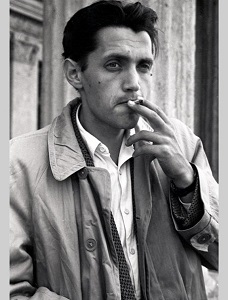
Robert Rozhdestvensky (20 juni 1932 – 19 augustus 1994)
De Zwitserse schrijfster Laure Wyss werd geboren op 20 juni 1913 in Biel/Bienne. Zie ook alle tags voor Laure Wyss op dit blog.
Uit: Wahrnehmungen
«Darauf gebe ich dir gern Antwort, lieber Josy. Deine Mutter kam in mein Leben, als sie dich bei uns oben in den Bergen besuchte. Sie war, als Flüchtlingsfrau, in einem schweizerischen Lager eingesperrt, es war noch während des Krieges, 1943 denke ich, während du aus dem Lager in eine Pflegefamilie kamst, ins Bergdorf, in meine kinderlose Ehe. Durch welche Vermittlung, das weiss ich nicht mehr. Es wurden Plätze für Flüchtlingskinder gesucht. Die Mädchen, die herzigen, fanden leicht Unterkunft, aber so ein dreizehnjähriger Bub, ein jüdischer Bub zudem, da wurde gezögert. Ich selber habe dich aber als Demonstration gewünscht, im Bergort war meine Umgebung sehr deutschfreundlich, also auch aus egoistischen Gründen nahm ich dich auf, mein lieber Josy, daran würde man meine Einstellung zur Kriegssituation erkennen. Es gelang ja dann auch, denn einige Leute im Bergort kamen nicht mehr zu uns zu Besuch, und das freute mich sehr. Aber ich glaube, ich habe dich ausgenützt, das musste ich dir einmal gestehen.»
«Aber nun über meine Mutter, bitte», so Josy.
«Für mich war sie eine demütige Frau, eine Frau, die nicht klagte, nicht über die Leiden der Verfolgung redete. Eine Frau, die ein schweres Schicksal ertrug. Sie war glücklich, dass ihr Sohn vom Lager befreit war und dass sie selber, einmal im Monat, frei bekam und zusammen mit ihrem zweiten Mann dich besuchen durfte.“
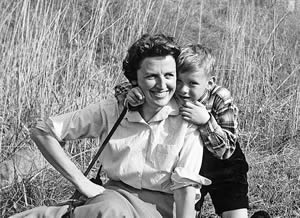
Laure Wyss (20 juni 1913 – 21 augustus 2002)
Hier met haar zoontje, eind jaren 1950
De Amerikaanse schrijfster en vertaalster Lillian Hellman werd geboren op 20 juni 1905 in New Orleans. Zie ook alle tags voor Lillian Hellman op dit blog.
Uit: Eating Together (Samen met Peter Feibleman)
““We can’t have mussels and spaghetti with basil. That’s two first courses.”
“So have the mussels,” I said.
“Don’t answer before you think,” Lillian said. “If we have mussels, what am I going to do about all the basil in the garden?—what about that?”
I swallowed another half cup of coffee and said she could have them both if she put them together.
“You see?” Lilly said, brightening, “if you’d just try thinking once in a while your whole life would be different.”
[…] When Saturday came she sat down in the same chair at five o’clock, dressed for the party, and said: “I don’t see why all those people are coming to my house expecting me to feed them. It’s your fault,” she said to Mike, who was coming downstairs with Annabel. “I’m only doing this for you.”
“I didn’t want a party,” Mike said gently; “I came to rest.”
“That’s no excuse and you know it,” Lillian said […]
“They should all be honored you invited them,” Annabel said loyally.
“Fuck all of them,” Lillian said, “except the Herseys. Let’s have a drink.”
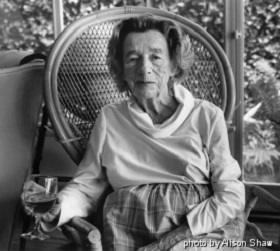
Lillian Hellman (20 juni 1905 – 30 juni 1984)
De Engelse dichter en toneelschrijver Nicholas Rowe werd geboren in Little Barford, Bedfordshire, op 20 juni 1674. Zie ook alle tags voor Nicholas Rowe op dit blog.
Uit: Some Account of the Life of Mr. William Shakespear
“He had bred him, 'tis true, for some time at a Free-School, where 'tis probable he aquir'd that little Latin he was Master of: But the narrowness of his Circumstances, and the want of his assistance at Home, forc'd his Father to withdraw him from thence, and unhappily prevented his further Proficiency in that Language. It is without Controversie, that he had no knowledge of the Writings of the Antient Poets, not only from this Reason, but from his Works themselves, where we find no traces of any thing that looks like an Imitation of 'em; the Delicacy of his Taste, and the natural Bent of his own Great Genius, equal, if not superior to some of the best of theirs, would certainly have led him to Read and Study 'em with so much Pleasure, that some of their fine Images would naturally have insinuated themselves into, and been mix'd with his own Writings; so that his not copying at least something from them, may be an Argument of his never having read 'em. Whether his Ignorance of the Antients were a disadvantage to him or no, may admit of a Dispute: For tho' the knowledge of 'em might have made him more Correct, yet it is not improbable but that the Regularity and Deference for them, which would have attended that Correctness, might have restrain'd some of that Fire, Impetuosity, and even beautiful Extravagance which we admire in Shakespear: And I believe we are better pleas'd with those Thoughts, altogether New and Uncommon, which his own Imagination supply'd him so abundantly with, than if he had given us the most beautiful Passages out of the Greek and Latin Poets, and that in the most agreeable manner that it was possible for a Master of the English Language to deliver 'em. (note 3) Some Latin without question he did know, and one may see up and down in his Plays how far his Reading that way went: In Love's Labour lost, the Pedant comes out with a Verse of Mantuan; and in Titus Andronicus, one of the Gothick Princes, upon reading
Integer vitæ scelerisque purus
Non eget Mauri jaculis nec arcu-
says, 'Tis a Verse in Horace, but he remembers it out of his Grammar: Which, I suppose, was the Author's Case. »
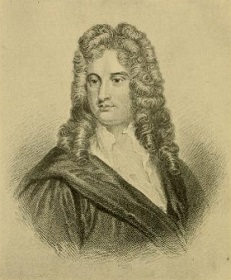
Nicholas Rowe (20 juni 1674 - 6 december 1718)
De Afrikaans-Amerikaanse schrijver en essayist Charles Waddell Chesnutt werd geboren op 20 juni 1858 in Cleveland, Ohio. Zie ook alle tags voor Charles W. Chesnutt op dit blog.
Uit: The Colonel's Dream
“Mr. French sat on one side, Mr. Kirby on the other, of a handsome, broad-topped mahogany desk, equipped with telephones and push buttons, and piled with papers, account books and letter files in orderly array. In marked contrast to his partner's nervousness, Mr. French scarcely moved a muscle, except now and then to take the cigar from his lips and knock the ashes from the end.
"Nine fifty!" ejaculated Mr. Kirby, comparing the clock with his watch. "Only ten minutes more."
Mr. French nodded mechanically. Outside, in the main office, the same air of tense expectancy prevailed. For two weeks the office force had been busily at work, preparing inventories and balance sheets. The firm of French and Company, Limited, manufacturers of crashes and burlaps and kindred stuffs, with extensive mills in Connecticut, and central offices in New York, having for a long time resisted the siren voice of the promoter, had finally faced the alternative of selling out, at a sacrifice, to the recently organised bagging trust, or of meeting a disastrous competition. Expecting to yield in the end, they had fought for position--with brilliant results. Negotiations for a sale, upon terms highly favourable to the firm, had been in progress for several weeks; and the two partners were awaiting, in their private office, the final word. Should the sale be completed, they were richer men than they could have hoped to be after ten years more of business stress and struggle; should it fail, they were heavy losers, for their fight had been expensive. They were in much the same position as the player who had staked the bulk of his fortune on the cast of a die. Not meaning to risk so much, they had been drawn into it; but the game was worth the candle.”
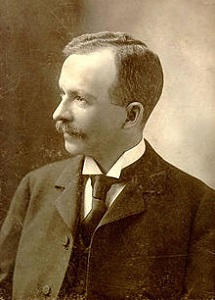
Charles W. Chesnutt (20 juni 1858 – 15 november 1932)
De Franse dichteres Marceline Desbordes-Valmore werd geboren op 20 juni 1786 in Douai. Zie ook alle tags voor Marceline Desbordes-Valmore op dit blog.
Jeune homme irrité
Jeune homme irrité sur un banc d'école,
Dont le coeur encor n'a chaud qu'au soleil,
Vous refusez donc l'encre et la parole
À celles qui font le foyer vermeil ?
Savant, mais aigri par vos lassitudes,
Un peu furieux de nos chants d'oiseaux,
Vous nous couronnez de railleurs roseaux !
Vous serez plus jeune après vos études :
Quand vous sourirez,
Vous nous comprendrez.
Vous portez si haut la férule altière,
Qu'un géant plîrait sous son docte poids.
Vous faites baisser notre humble paupière,
Et nous flagellez à briser nos doigts.
Où prenez-vous donc de si dures armes ?
Qu'ils étaient méchants vos maîtres latins !
Mais l'amour viendra : roi de vos destins,
Il vous changera par beaucoup de larmes :
Quand vous pleurerez,
Vous nous comprendrez !
Ce beau rêve à deux, vous voudrez l'écrire.
On est éloquent dès qu'on aime bien ;
Mais si vous aimez qui ne sait pas lire,
L'amante à l'amant ne répondra rien.
Laissez donc grandir quelque jeune flamme
Allumant pour vous ses vagues rayons ;
Laissez-lui toucher plumes et crayons ;
L'esprit, vous verrez, fait du jour à l'âme :
Quand vous aimerez,
Vous nous comprendrez !
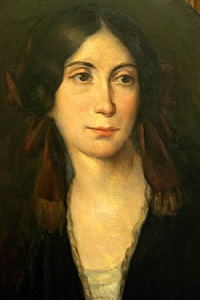
Marceline Desbordes-Valmore (20 juni 1786 – 23 juli 1859)
De Franse dichter en schrijver Joseph Antoine Autran werd geboren op 20 juni 1813 in Marseille. Zie ook alle tags voor Joseph Autran op dit blog.
Chansons du soir
Après un jour d'été, quand la ville s'endort,
Qu'elle étouffe l'écho de ses rumeurs dernières ;
Quand les lampes du soir dans les maisons du port
S'allument, et sur l'eau projettent leurs lumières ;
Le long des quais obscurs, il est doux d'écouter,
Dans cet apaisement des heures recueillies,
Les airs que les marins se prennent à chanter
D'une âme enfin rendue à ses mélancolies.
Préludant au sommeil qui va bientôt venir,
Ce chant, dont la tristesse à temps égaux s'exhale,
Pour chaque matelot est comme un souvenir,
Comme une vision de la terre natale.
Marqué de son accent chaque peuple a le sien :
L'Anglais un rythme dur, mêlé de quelque ivresse,
L'Espagnol un refrain pieux, l'Italien
Des couplets que l'amour emmielle de tendresse.
Mais, entre ces accords, à mon gré le plus doux,
C'est l'air vague et plaintif, la sourde cantilène
Que les matelots grecs, hôtes fréquents chez nous,
Chantent sur leur navire, assis vers la poulaine.
Sans varier d'un son, d'où viens-tu, chant si vieux,
Héritage flottant qu'un siècle à l'autre envoie ?
Est-il vrai, matelots, que, parmi vos aïeux,
On le chantait aux jours de la guerre de Troie ?...
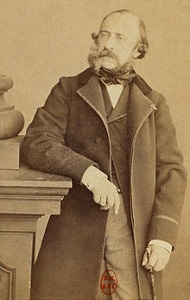
Joseph Autran (20 juni 1813 – 6 maart 1877)
|



